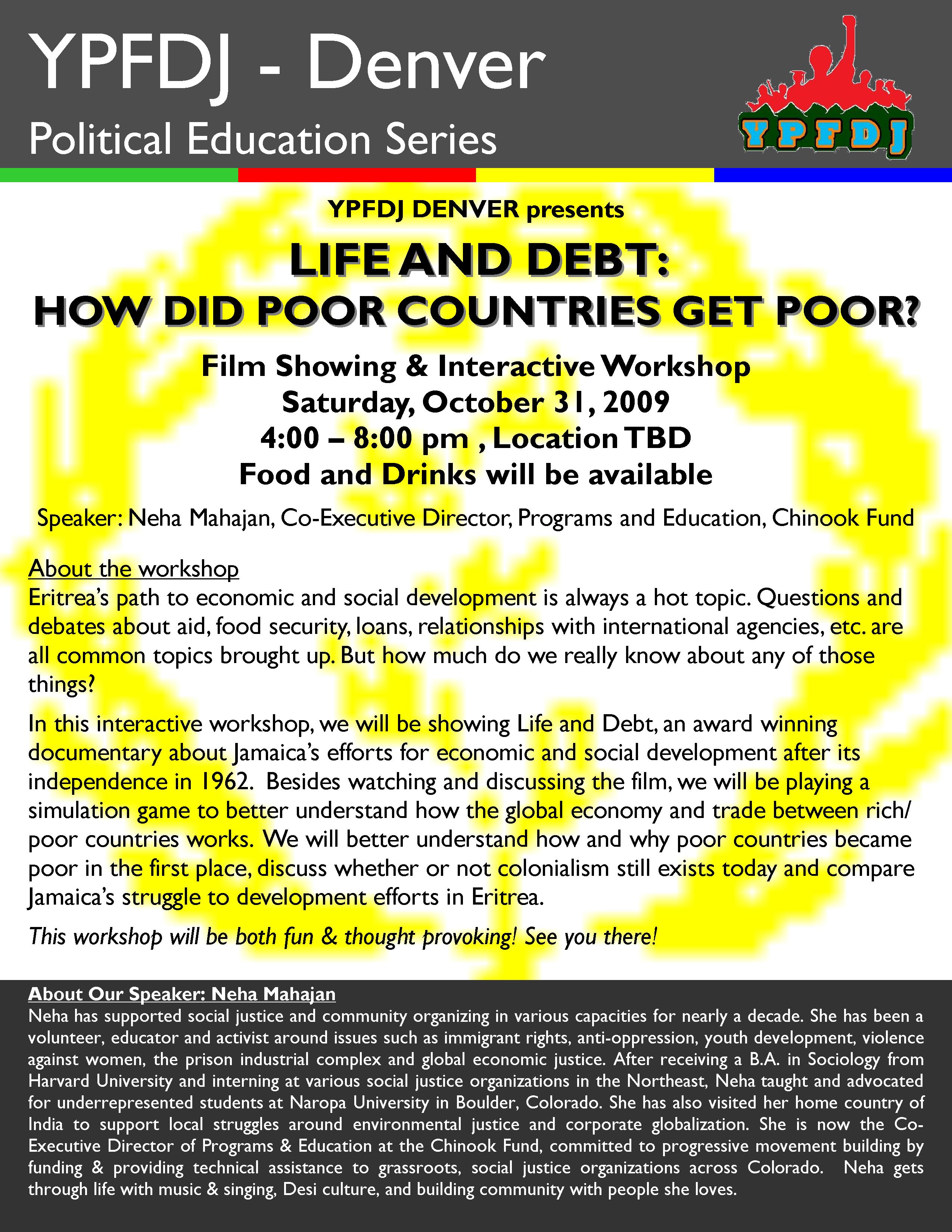From: YPFDJ DENVER (ypfdjdenver@gmail.com)
Date: Wed Oct 21 2009 - 23:58:17 EDT
YPFDJ-Denver presents Life and Debt: How Did Poor Countries Get Poor? Film
Showing & Interactive Workshop Saturday, October 31 4:00 – 8:00 pm,
Location: TBD Food and Drinks will be available
Speaker: Neha Mahajan, Co-Executive Director, Programs and Education,
Chinook Fund
*Summary* Eritrea’s path to economic and social development is always a
hot topic. Questions and debates about aid, food security, loans,
relationships with international agencies, etc. are all common topics
brought up. But how much do we really know about any of those things? In
this interactive workshop, we will be showing Life and Debt, an award
winning documentary about Jamaica’s efforts for economic and social
development after its independence in 1962. Besides watching and discussing
the film, we will be playing a simulation game to better understand how the
global economy and trade between rich/poor countries works. We will better
understand how and why poor countries became poor in the first place,
discuss whether or not colonialism still exists today and compare Jamaica’s
struggle to development efforts in Eritrea. This workshop will be both fun
& thought provoking! See you there!
*
*
*About Neha Mahajan*
Neha has supported social justice and community organizing in various
capacities for nearly a decade. She has been a volunteer, educator and
activist around issues such as immigrant rights, anti-oppression, youth
development, violence against women, the prison industrial complex and
global economic justice. After receiving a B.A. in Sociology from Harvard
University and interning at various social justice organizations in the
Northeast, Neha taught and advocated for underrepresented students at Naropa
University in Boulder, Colorado. She has also visited her home country of
India to support local struggles around environmental justice and corporate
globalization. She is now the Co-Executive Director of Programs & Education
at the Chinook Fund, committed to progressive movement building by funding &
providing technical assistance to grassroots, social justice organizations
across Colorado. Neha gets through life with music &
singing, Desi culture, and building community with people she loves.
About Life & Debt
*Life and Debt* explores the effect of the International Monetary Fund's
(IMF) policies on developing countries through Jamaica's experience with the
organization. Jamaica, having gained its independence from Britain in 1962,
found itself struggling as a result of the oil embargo the following year.
In order to receive loans from the IMF, the country entered into a tricky
agreement with its lenders. The terms of the loan stipulated that Jamaica
had to agree to reduce trade barriers by withdrawing its local import
restrictions, and thus enter the world market. The local economy became
flooded with foreign goods, which were cheaper than those produced locally,
resulting in a loss of jobs and economic self-reliance. Interviews with
Stanley Fisher, Deputy Director of the IMF, reveal that the IMF's mission is
to alleviate short-term deficits, not assuage long-term economic hardship.
A powerful example of the cycle of dependence is seen through the method of
milk production. Because production is heavily subsidized for farmers in the
U.S., Australia, New Zealand, and the European Union, milk solids enter the
Jamaican market at an extremely low price. The powder has become the normal
form of milk consumption, for though it is produced at a greater cost than
fresh milk, the subsidies make it less expensive to purchase. In one
unsettling scene, dairy farmers dispose of thousands of gallons of fresh
milk that they cannot sell. Many farmers have reduced the size of their
operations by slaughtering or selling cattle, and the dairy industry has
become debilitated beyond repair.
The viewer is also privy to the reality of life in Jamaica behind the façade
of the tourist industry. Inadequate schools, medical facilities and living
conditions dominate the areas apart from the plush hotels that dot the
coastal beaches. In a voice over written by Jamaica Kincaid, the narrator
emphasizes this striking contrast between ideal scenic beauty and the
squalor of poverty. The strength of the film lies in its comprehensive
explanation of the role of the IMF and its interrelationship with the World
Bank and the World Trade Organization. All audiences will benefit from the
examination of global economic policies and their effect on developing
economies.

----[This List to be used for Eritrea Related News Only]----